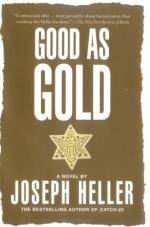|
This section contains 272 words (approx. 1 page at 300 words per page) |

|
Heller has explained his literary preparation for his third novel: "For Good as Gold I intentionally read English comic writers—Austen, Dickens, Wodehouse and Waugh. I was looking for certain kinds of 'literary cliches.'" Dickens's influence seems especially predominant in the flat, sometimes ludicrous characterizations and the Great Expectations (1861) narrative pattern of depicting the rise of the protagonist's hopes for success despite other characters' warnings and then the abrupt puncturing of his dreams.
Heller even directly refers to Dickens in the novel as "a long winded novelist . . .
whose ponderous works," in Gold's opinion, "were always too long and always flawed by a procession of eccentric, one-sided characters too large in number to keep track of, and an excessive abundance of extravagant coincidences and other unlikely events"—an ironic reminder of critics' complaints about Heller's own novels. Gold's pursuit of Andrea Conover's hand in...|
This section contains 272 words (approx. 1 page at 300 words per page) |

|




